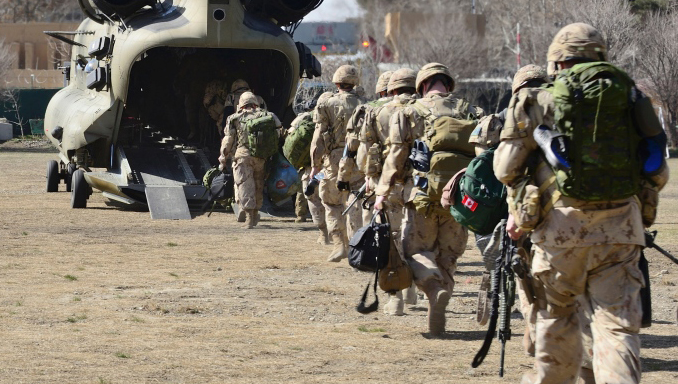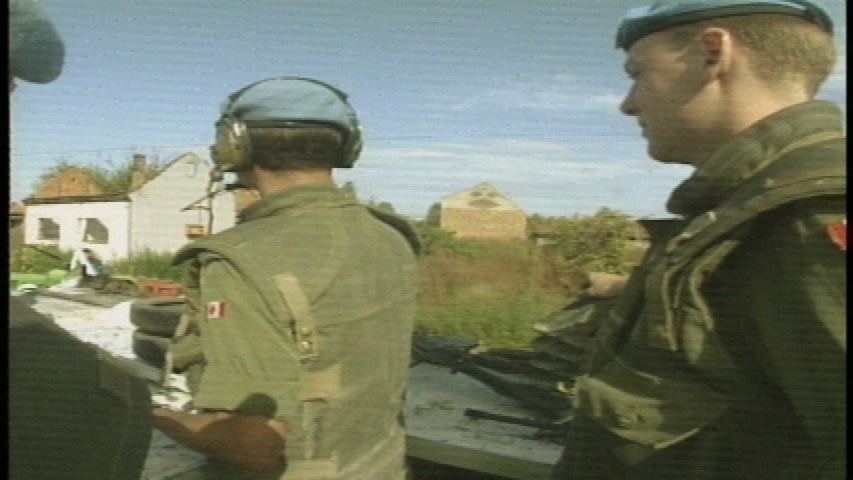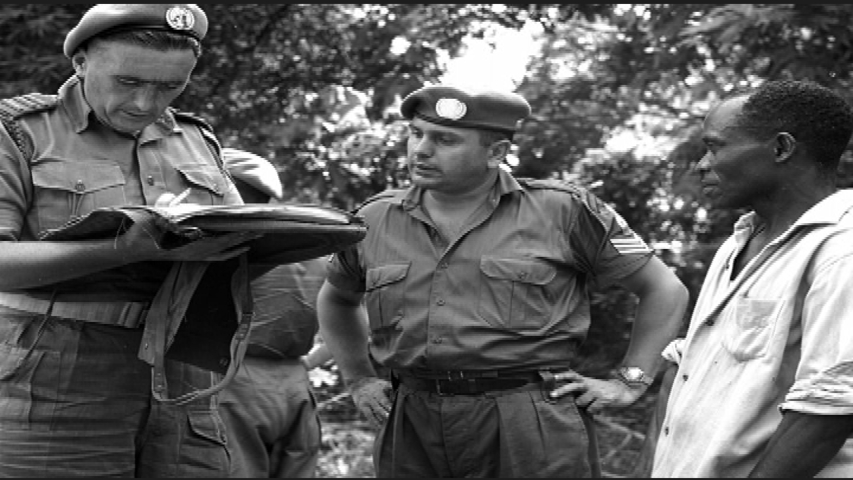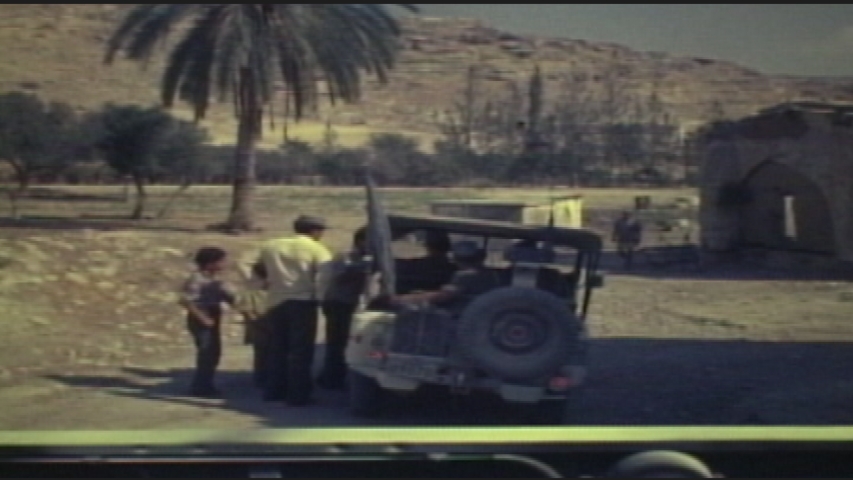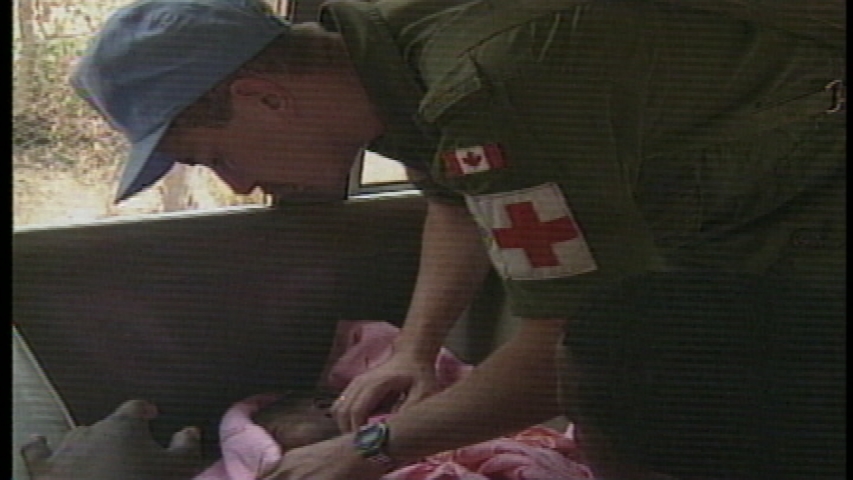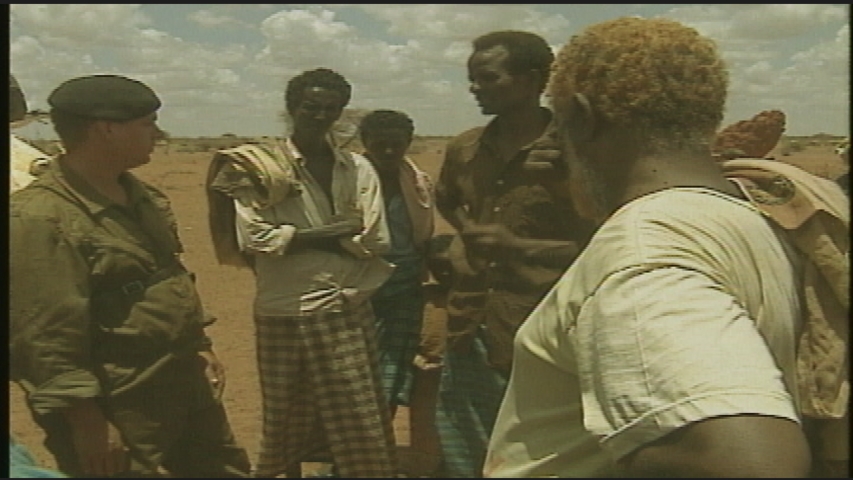Middle East - Canadian Armed Forces in the Middle East
Canadian Armed Forces
Middle East - Canadian Armed Forces in the Middle East
Transcript
World Globe spinning as text appears on screen "Canadians in The Middle East" map of Middle East appears on screen
Well you first arrive, it’s all desert, it’s hot, there’s very strong customs,Canadian Forces Veteran Ron Gourlay
there’s different tribes who are warring. And it’s my first UN experience where the two parties that had been warring had been separated by X number of miles and we have to sit in the middle.Canadian Forces Veteran Maurice LaChapelle
You know, there were always flare-ups, and when I say flare-ups, I mean they’d always be conducting little wars and attacking each other. That’s the reason we were there.Canadian Forces Veteran Murray Floyd
We were there to try and keep the Israelis and the Egyptians from killing each other.Canadian Forces Veteran Donald Ethell
With both societies you have to prove yourself and you have to establish credibility, you’ve got to establish trust,Camels grazing and locals speak with a United Nations soldier
you’ve got to remain neutral.Canadian Forces Veteran Murray Floyd
We were peacekeepers with no weapons.Canadian Forces Veteran Fred Gallant
That was our protection, basically we were unarmed observers which gave us free access to anywheres in the conflict area.Canadian Forces Veteran David Laxton
They issued you an SMG sub-machine gun, a magazine and ten rounds and they told you, put the weapon over your shoulder, put the magazine in one pocket, put the ten rounds in the other pocket just so you don’t create an international incident and they give you a baseball bat and said, “If you have any problems, just wave this at the people, they’ll go away.” (laugh)Canadian Forces Veteran Camillien Gaudet
In the evenings, you could hear the canons firing, so it wasn’t the most peaceful place to be.Canadian Forces Veteran Remi Lefebvre
It was...it was war.Cement building with cross, rough debris scattered all over the rocky ground
We saw homes, cemeteries,Canadian Forces Veteran Normand St-Onge
churches destroyed and all that.Canadian Forces Veteran John Perry
We always had a spare truck, a water truck with us type of thing, and a fuel truck, you know.Jeep driving across the dusty terrain, the desert
Kind of a lonely trips out there in hot desert, you know.Locals walking in street; covered canvas tents line the roadway
Canadian Forces Veteran John Nystad
And as I’m going through all these villages people would wave at you and all this, no they’re throwing camel dung at me, they're throwing stones and sticks at me.Caravan of big army trucks turns on road as soldier stands on guard with rifle in hand
Canadian Forces Veteran Norman St-Onge
There were barriers, like borders, between every town. You’d have to cross before five in the evening. If you got stuck between two towns,Tanks travelling across the desert
it was tough luck, you’d have to wait. You had to know where all theRoadblock setup with sandbags, soldiers standing on guard with weapons mounted on tank
roadblocks were because there’d be,Canadian Forces Veteran Bert Diamond
next thing you know, you’re driving along and all of a sudden there’s a guy standing in front of you with a weapon just aimed right at the driver.Canadian Forces Veteran John Nystad
And this Egytian soldier, looks in the van, and he's sticking his rifle in there and he's got it cocked because, tchk, tchk, we heard the bolt, and he wanted cigarettes.Canadian Forces Veteran Ron Gourlay
You never knew. There’s a possibility there’s mines leftThe feet of a soldier walking through the terrain with a stick in hand checking for mines
through these places,Two soldiers standing over bombing equipment
there’s bombs left from prior wars.Soldier digging in ground, equipment and debris all around
So if we lost control,United Nations soldier walks toward army tank
if we ended up hitting an antitank bomb,Canadian Forces Veteran Normand St-Onge
everything blew up.Priest stands in front of two wooden caskets while soldiers stand on guard on boths sides of concrete platform
They didn’t bring the bodies home then, they left the bodies there.Soldiers and local people walking through the crowded streets
At the time we were in Egypt we were able to keep it pretty well neutral.Canadian Forces Veteran Bob Terry
That was boring which isn’t a bad thing. Boring is good.Street view of cars and jeeps, locals walking and canvas covered buildings along the roadway
When you talked to people who had seen what was going on with Syria, Israel, and Egypt, it was a good thingCanadian Forces Veteran Camillien Gaudet
we were there to stop the war.Canadian Forces Veteran Murray Floyd
We didn’t achieve anything. I don’t think you’ll find one person that can honestly say he feels that his tour of duty in the Middle East at that time made a difference.Canadian Forces Veteran Bob Terry
Because as soon as you move out these people start fighting each other again.Canadian Forces Veteran Red Grossinger
Totally impotent in the sense that you can’t do a thing, can’t stop the killing.Canadian Forces Veteran Fred Gallant
It took a long time to realize there’s two sides to every story and there’s no right or wrong over there. They have been fighting for four thousand years and they probably will continue.Description
Collection of interviews with veterans of the Canadian Armed Forces recounting their story of military service in the Middle East. The veterans of this video are: Ron Gourlay, Maurice Lachapelle, Murray Floyd, Donald Ethell, Fred Gallant, David Laxton, Camilien Gaudet, Rémi Lefebvre, Normand St-Onge, John Perry, John Nystad, Bert Diamond, Bob Terry et Red Grossinger.
Meta Data
- Medium:
- Video
- Owner:
- Veterans Affairs Canada
- Recorded:
- February 2, 2010
- Duration:
- 4:27
Related Videos
- Date modified:



